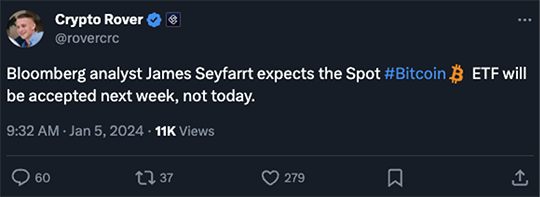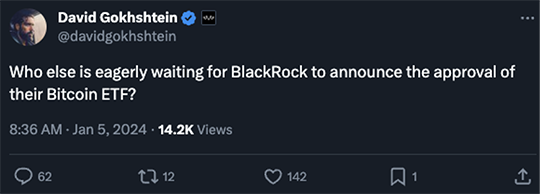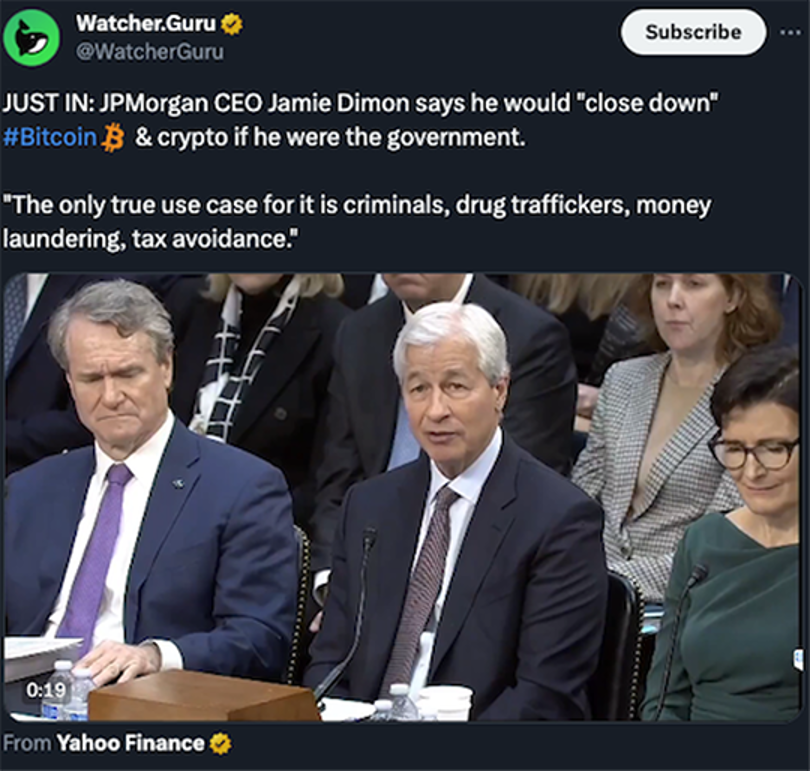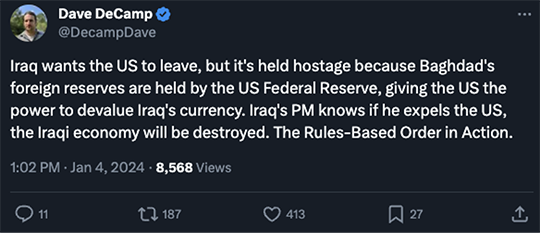What Do JPM and BlackRock Know That You Don’t?
![]() Crypto Catalyst: Next Wednesday (or Anytime Sooner)
Crypto Catalyst: Next Wednesday (or Anytime Sooner)
 The rumors in crypto-land are flying at warp speed this morning…
The rumors in crypto-land are flying at warp speed this morning…


Since mid-November, the Securities and Exchange Commission has faced a deadline of next Wednesday, Jan. 10, to make a momentous decision — whether to approve the first ETFs backed by Bitcoin.
Not Bitcoin futures — those ETFs have been around for years now — but actual Bitcoin.
The deadline is ironclad: It stems from a lawsuit won last summer by Grayscale Investments, which sued the SEC for dragging its feet on Grayscale’s application to issue a Bitcoin ETF.
At this point, every indication is the SEC will give the thumbs-up by next Wednesday. Earlier this week, Bloomberg cited an anonymous source who said that Grayscale is already in talks with JPMorgan Chase and Goldman Sachs. “Both are being considered to be authorized participants — firms that have the power to create and redeem shares of the fund.”
Presumably heavy hitters like JPM and the vampire squid wouldn’t even answer Grayscale’s calls unless they knew the feds would give Grayscale their blessing.
Oh, and from the Department of Hypocrisy, let’s not forget this precious moment we shared only a month ago. (Paradigm Press publisher Matt Insley reminded me of it this morning…)

That was during a congressional hearing, by the way. Wonder if someone will call out Dimon on it the next time he treks to Capitol Hill. (Nah, who are we kidding?)
 Thing is, approval could come anytime before next Wednesday. And the SEC could give its blessing to several Bitcoin ETFs — not just Grayscale’s.
Thing is, approval could come anytime before next Wednesday. And the SEC could give its blessing to several Bitcoin ETFs — not just Grayscale’s.
There’s an “approval window” that opens today.
“Thirteen spot Bitcoin exchange-traded fund applications await approval,” says Investor’s Business Daily. “They include applications by BlackRock, ARK Invest, Grayscale Investments, WisdomTree, VanEck, Valkyrie, Invesco and Fidelity.”
Hmmm… Usually what BlackRock wants, BlackRock gets. It’s the biggest asset manager in the world, after all.
A handful of spot Bitcoin ETFs would open up the cryptoverse to the world of institutional investors — pension funds, university endowments, insurance companies, funds run by registered investment advisers. For them, an ETF is much more manageable than a “native” Bitcoin token.
What’s the growth trajectory? Well, when GLD — the first spot gold ETF — debuted in 2004, it attracted $1.9 billion (in 2023 dollars) during the first four weeks, rising to $4.8 billion by the end of its first year.
The advent of GLD helped propel the gold price from $440 in late 2004 to a peak over $1,900 in less than seven years.
 So you can well imagine why James Altucher, Paradigm’s resident crypto evangelist, says the present moment is shaping up to be “the final crypto bull run.”
So you can well imagine why James Altucher, Paradigm’s resident crypto evangelist, says the present moment is shaping up to be “the final crypto bull run.”
When James speaks about crypto, it’s worth listening: He first talked up Bitcoin on CNBC in 2013, when Bitcoin fetched a mere $114.
More recently, he recommended a crypto called Solana to his readers at $11. Less than a year later, it soared as high as $260. He also personally invested in Filecoin when it was trading for less than $1 in 2017. It reached a record high of $237 in 2021.
Bitcoin has nearly tripled in the last year, trading earlier this week over $45,000. And James has every expectation it could reach $100,000 by year-end. A clean double.
“But the thing is,” James says, “the biggest gains will not come from Bitcoin.
“You see, there are six tiny cryptos that could soar 10X, 50X, even 100X over the next 12 months that will far outperform Bitcoin.”
James laid it all out last night during an Emergency Crypto Briefing for his most faithful readers. We figured it was only fair to give them dibs.
But today, we’re opening it up for everyone who subscribes to a Paradigm publication. After all, the window of opportunity is extremely narrow: As I said above, it will slam shut no later than next Wednesday and in fact could slam shut anytime starting today. Give it a look right now, while there’s still time.
![]() The “Hot” Job Numbers Are Really Lukewarm
The “Hot” Job Numbers Are Really Lukewarm
 The December job numbers are out this morning, and the market reaction is… interesting.
The December job numbers are out this morning, and the market reaction is… interesting.
The wonks at the Bureau of Labor Statistics conjured 216,000 new jobs for the month — more than anyone was expecting among dozens of economists polled by Econoday. The official unemployment rate held steady at 3.7%.
The knee-jerk reaction was oh-so-predictable: “Dow futures fall more than 150 points after hot jobs report,” said a CNBC alert. Oh noes! The Fed might wait until May to start cutting rates instead of March! SELL!
 But then, Mr. Market started looking under the hood with these numbers — concluding there’s less than meets the eye.
But then, Mr. Market started looking under the hood with these numbers — concluding there’s less than meets the eye.
For one thing, the previous two months’ numbers were revised down — by a not-insignifcant 71,000 jobs. These downward revisions are becoming a pattern, by the way.
For another thing, nearly 1.5 million people departed the labor force in December — some of them retiring, no doubt, but the bulk of them simply giving up looking for work. That means they’re not counted in the official unemployment rate.
Thus, two numbers the statisticians can’t manipulate took a decided turn for the worse…
- The labor force participation rate — the percentage of working-age adults either working or looking for work — dropped from 62.8% to 62.5%
- The employment-population ratio fell from 60.4% to 60.1%.
In both cases, all the ground that was gained in the last year was lost in one month.
The labor market isn’t nearly as “hot” as the headline numbers suggest. Right or wrong, Mr. Market’s expectations for Fed rate cuts next year are no different now than they were yesterday.
 So on further reflection, Wall Street is staging a modest rally today.
So on further reflection, Wall Street is staging a modest rally today.
The S&P 500 is up six-tenths of a percent to 4,717. For all the mainstream hand-wringing about the market sell-off earlier this week, that’s only 1.7% below the index’s record close in early 2022.
Precious metals are on the rally tracks — spot gold back above $2,050 and spot silver over $23 again. Bonds are likewise rallying, the yield on a 10-year Treasury note just below 3.97%.
![]() Oil Rallies: More Middle East Mayhem
Oil Rallies: More Middle East Mayhem
 Crude has bounced over 2% today — presumably because of a story that’s being woefully underplayed in corporate media.
Crude has bounced over 2% today — presumably because of a story that’s being woefully underplayed in corporate media.
An American drone strike in Baghdad has killed Abu Taqwa, a senior leader of Iraq’s Popular Mobilization Forces — a Shia Muslim militia that’s part of the government’s security force.
The Defense Department blames Abu Taqwa for attacks on U.S. bases in Iraq and Syria that began in October — a response to U.S. support for Israel’s assault in Gaza. That said, the Pentagon hasn’t presented any evidence to back up that assertion.
Iraq’s government calls the attack a “flagrant violation of the sovereignty and security of Iraq” and says it’s “no different from a terrorist act.”
It’s been four years since Iraq’s parliament voted to expel U.S. troops from the country. That was after a U.S. drone strike that killed Iranian Gen. Qasem Soleimani during a visit to Baghdad. Nonetheless, 2,500 U.S. troops remain in Iraq — serving no purpose other than as a tripwire for war with Iran.

To the extent corporate media are covering this drone attack on the militia leader, they describe the militia as “Iran-linked.”
The news comes on the heels of Israel’s drone strike on a Hamas leader in Lebanon… and a bombing attack in Iran for which ISIS took responsibility, killing 84 people.
But unlike those two incidents, this one threatens to draw in U.S. troops as combatants.
![]() Global Shipping: Insult Added to Injury
Global Shipping: Insult Added to Injury
 Meanwhile, global shippers continue to steer clear of the Red Sea — the better to avoid Yemen’s Houthi faction, which is harassing Israel-linked shipping.
Meanwhile, global shippers continue to steer clear of the Red Sea — the better to avoid Yemen’s Houthi faction, which is harassing Israel-linked shipping.
As we mentioned toward the end of last year, avoiding the Red Sea means also avoiding the Suez Canal — and thus sailing all the way around Africa and the Cape of Good Hope, adding as much as 40% to travel time between Asia and Europe — to say nothing of additional fuel costs.
Even worse, those ships need to refuel and resupply in South Africa — which happens to be home to some of the worst-performing ports in the world.
The World Bank issues a Container Port Performance Index, ranking the performance of 348 ports worldwide. Three South African ports — Durban, Ngqura and Cape Town — rank in the bottom 10. The “best” South African port is Port Elizabeth, ranked a mediocre 291.
“A two-week delay around the Cape could easily turn into a month as ships may be backlogged while the port cycles the excess ships through,” write the analysts at the Forward Observer research service — who had the presence of mind to consult the World Bank rankings.
![]() Mailbag: The Deep State and Walmart Precious Metals
Mailbag: The Deep State and Walmart Precious Metals
 “Hearing things like ‘bombs going off in Iran’ concern me greatly,” a reader writes as we stay in the Middle East.
“Hearing things like ‘bombs going off in Iran’ concern me greatly,” a reader writes as we stay in the Middle East.
“Over the last four–six years, I've become completely jaded about what those in power will do to retain their power. While the deep state rumors of years past sounded like a Robert Ludlum novel come to life, I think it's now beyond argument that when it comes to protecting its power, the bureaucracy and industrial-military complex will do whatever it takes to stay in power and to maintain its gravy train regardless of the cost to humanity, humans and our founding principles.
“We are in an election year where the leading candidates are about as anti-deep state and pro-deep state as one can possibly be. Whatever that means, at a minimum, it means that Trump (and candidates like RFK Jr.) cannot be elected and must be defeated at any cost. All options are on the table.
“One is to drag us into a direct war. How do we do that? Set off bombs in Iran — keep smacking the beehive with a stick. Make Dems the wartime party. It seems crazy, but why not in their minds?
“This is just one of the many, many levers that the deep state has at its disposal to preserve itself. But, to me, this is an obvious one.”
Dave responds: I too speculated last fall that Team Biden is itching to get into a war with Iran, and fretted over a Gulf of Tonkin-type “incident” as the catalyst. As you suggest, there’s nothing like being a “wartime president” to boost an incumbent’s election prospects. Besides, they need some sort of distraction from the looming failure in Ukraine.
But I suspect (hope?) there’s some institutional memory somewhere within the deep state about a tabletop exercise the Bush administration conducted in 2002, scheming out a war with Iran.
It went so badly for the American side that the exercise was suspended, the “sunk” American ships “refloated” and the Iranian side made to play by different rules. The retired Marine general in charge of the exercise quit in disgust while it was still underway.
Recall also that at the behest of Vice President Cheney, the United States came dangerously close to attacking Iran in the spring of 2007. For once, however, cooler heads prevailed — maybe because the memory of that 2002 exercise was still fresh in someone’s mind?
Nothing has fundamentally changed since then: “In a putative war against Iran,” tweets the military analyst William Schryver, “the U.S. Navy would be unable to operate in the Persian Gulf. Iran would let them in, but they would never leave afloat. If the U.S. Navy cannot operate in the Persian Gulf, it cannot defeat Iran.”
Brings to mind a grim joke about how the Navy has only two types of vessels — submarines and targets…
 Maybe Walmart offers a good deal on precious metals after all: At least that’s one reader’s experience.
Maybe Walmart offers a good deal on precious metals after all: At least that’s one reader’s experience.
“I purchased 100 2023 Silver Eagles Mint-sealed tubes thru Walmart via APMEX at a huge discount to APMEX pricing!” he enthuses.
“Walmart initially charged California sales tax, but backed it off the following day. Bullion purchases in California are tax exempt IF over $2,000.
“And now Costco is selling (when available) Silver Eagles at big discounts. Executive Membership plus a B of A rewards card takes another 4% off of the premium to spot price. Costco’s smaller purchase limits will put you in the sales tax penalty box, however.”
Dave responds: You mean the Costco-branded Citi card? Also known as the bane of your editor’s existence?
I didn’t plan to rant about this, but as long as someone brought it up…
When Costco switched from AmEx to Citi a few years ago, I grudgingly made an exception to my rule that I don’t do business with the biggest of the too-big-to-fail banks.
That is, until scammers got to my Costco Citi card three times in 14 months, most recently in November. And while some of the businesses I patronize via autobill have the technological know-how to automatically switch to the replacement card number when this happens, that’s not at all universal.
No, I was never out any money for fraudulent charges but the pain-in-the-ass factor was just too much — the February “bonus check” notwithstanding.
The check arriving next month will be the last: As of the first of the year, my wife and I have fully transitioned to a different card for everyday use. I imagine the “rewards” won’t be as lucrative — we’ll probably just get Amazon gift cards or something — but ya gotta draw the line somewhere, right?
Have a good weekend,

Dave Gonigam
Managing editor, Paradigm Pressroom's 5 Bullets










